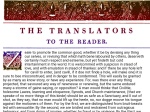
Because I’m a Bible translator, so I do strange things. For example, I actually read the prefaces to Bible translations. The preface usually addresses how and why the translation was done The original preface to the King James Version deals mostly with criticisms and objections. For example, the King James translators tackle the perennial question “Why on earth are you guys doing yet another translation? Of course, the question was phrased more eloquently in that day.
I’m interested in a different question – is a translation the Word of God? Purists say that they are not: that in order to truly read the Word of God one has to read the Bible in the languages in which it was first written. The King James translators reject that point of view. They wrote:
… we affirm and avow, that the very meanest translation of the Bible in English set forth by men of our profession containeth the word of God, nay, is the word of God: as the King’s speech which he uttered in Parliament, being translated into French, Dutch, Italian, and Latin, is still the King’s speech, though it be not interpreted by every translator with the like grace, nor peradventure so fitly for phrase, nor so expressly for sense, every where.
So they maintained that every English translation is the Word of God even if it is not a particularly good translation. (I’m sure that they would not have included fraudulent translations.)
A colleague of mine addressed a similar question:
A common assumption about reading the Bible in the original languages is that by “reading the Greek” we’re actually finding out information that isn’t available to people who are reading a translation.
He rejects this idea. He points out that a person needs a very deep knowledge of Greek to get more out of it. In fact, a doctoral level is needed. Those translating the Bible into English have spent their lives studying the original languages. Unless we are willing to put in that same investment, we’re better off piggybacking on their knowledge by reading their translations.
If you are reading any of the major Bible translation, you are reading the Word of God. You are not missing out. God is not hindered in any way in guiding, instructing, or encouraging you through that translation.

Page from first printing of the King James Version of the Bible






